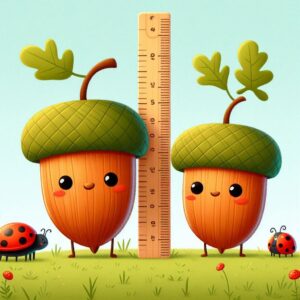どんぐりの背比べとは?
「どんぐりの背比べ」は、大きな違いがない者同士が優劣を競うことを意味することわざです。同じような実力や大きさの人や物が少しの違いを争っている様子を、どんぐりがほんの少しの高さを比べ合うことにたとえています。この表現には、「どれも大差なく、優劣がつけにくい」というニュアンスが含まれています。
由来と背景
どんぐりの木の実は、どれもほぼ同じような形や大きさをしています。並べて比べても、どんぐり同士の背の高さや形に大きな違いはなく、「どんぐりの背比べ」としても意味がないように見えます。このような状況が、些細な違いを争う人や物に例えられ、「大差がないのに無理に優劣をつけようとすること」を意味する表現となりました。
現代での使用例
「どんぐりの背比べ」は、特に似たような実力や条件の人や物の間で、無理に比較しようとする際に使われます。
スポーツや学業での実力比較
たとえば、同じようなレベルのチームや選手が競い合う状況で、「どちらもどんぐりの背比べのようなもので、大きな差はない」といった具合に使われます。
社内の成績や評価
同僚や同じ部署のメンバーが似たような成果を挙げている場合、「みんなどんぐりの背比べで、どれも大差ない」として、さほど差のない評価や成果について表現します。
他人との比較に執着する場面
同じクラスやグループで、ほとんど差のない成績や能力を比較しようとする際、「どんぐりの背比べ」に例えて、無駄な競争や見栄を指摘する意味でも使われます。
類似表現
「五十歩百歩」や「横並び」といった表現も、「どんぐりの背比べ」と似た意味で使われることがあり、これらも大きな差がないもの同士を比べることを指します。また、「大同小異」も小さな違いはあれど大きな違いはない、というニュアンスで使われます。
教訓
「どんぐりの背比べ」には、小さな差に固執することの無意味さや、どれも似たり寄ったりであることを客観的に見ることの大切さが込められています。物事の本質的な価値を見極める際には、ほんの少しの違いにこだわるよりも、全体を客観的に見る視点が必要であることを教えています。
「どんぐりの背比べ」とは、大きな違いがない者同士が優劣を競う様子を表したことわざです。この表現は、僅差にとらわれず本質を見極める姿勢の重要性や、無駄な比較に時間を費やさないことの意義を教えてくれる言葉です。
Compare acorn height. It compares people and things of similar ability and size competing over a small difference to acorns comparing just a little bit in height. This expression contains the nuance of “they are all much the same, and it is difficult to determine their superiority or inferiority.
Origin and Background
Acorns are all similar in shape and size. Even when compared side by side, there is no significant difference in height or shape between acorns, and it appears meaningless as a “Compare acorn height”. This situation was compared to people or things fighting over trivial differences, and the expression came to mean “to try to force a superiority or inferiority even though there is no great difference.Examples of Modern Usage
Acorn back comparison” is used when one tries to forcibly compare people or things, especially those with similar abilities or conditions.Comparing abilities in sports or academics
For example, when two teams or athletes at similar levels are competing against each other, the phrase is used to say, “They are like acorns on a mole’s back; there is not much difference between them.Internal performance and evaluation
When colleagues or members of the same department are achieving similar results, the phrase “They are all like acorns on a mole’s back, not much difference between them” is used to describe evaluations and achievements that are not very different.Situations that obsess over comparisons with others
When people in the same class or group try to compare their performance or ability with others with little difference, it can be used to point out unnecessary competition or vanity by comparing them to “acorns on a mole’s back”.Similar expressions
The phrases “50-50” and “side by side” are sometimes used in a similar way to “comparing the backs of acorns,” and also refer to comparing two things that are not very different from each other. The expression “big difference” is also used in the sense that there are small differences but not big differences.Lesson learned
Compare acorn height” expresses the pointlessness of obsessing over small differences and the importance of looking at things objectively, as they are all similar. It teaches us that when assessing the intrinsic value of things, it is necessary to look at the whole objectively, rather than focusing on the smallest differences.Conclusion
The phrase “acorns on acorns” is a proverb that describes a competition between people who do not differ greatly from each other. This expression teaches us the importance of not being obsessed with small differences, but rather of being willing to see the essence of the matter, and the significance of not spending time on useless comparisons.
AIが描いた「どんぐりの背比べ」























コメント